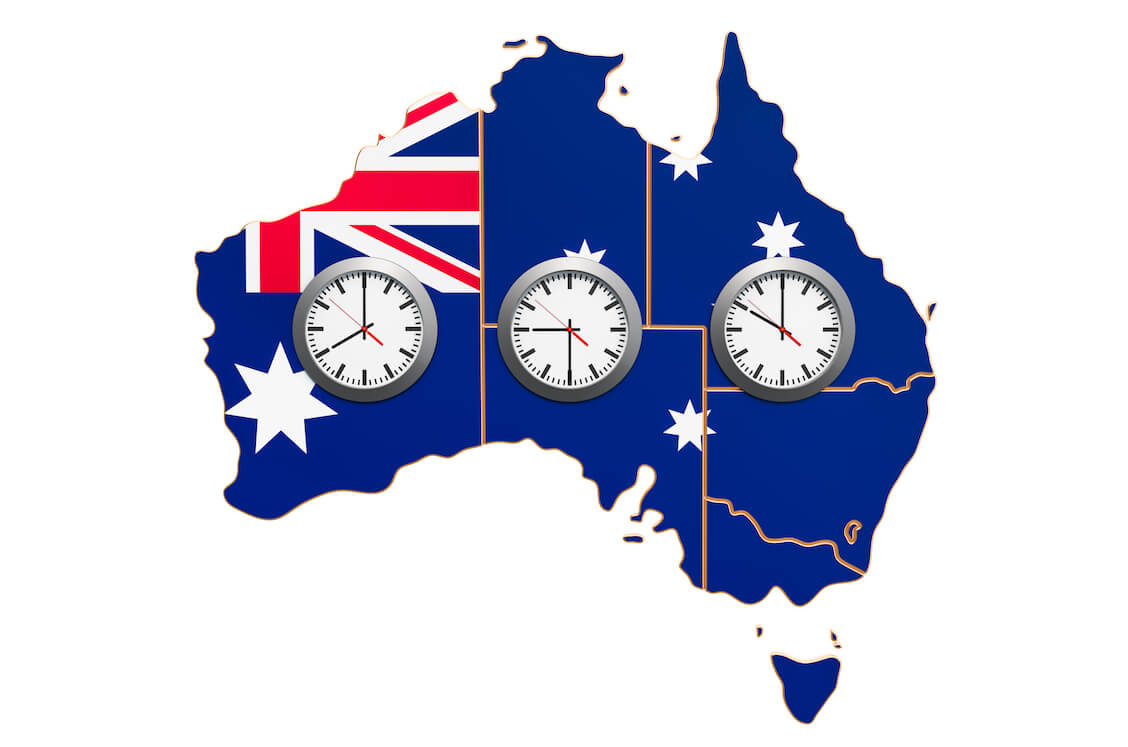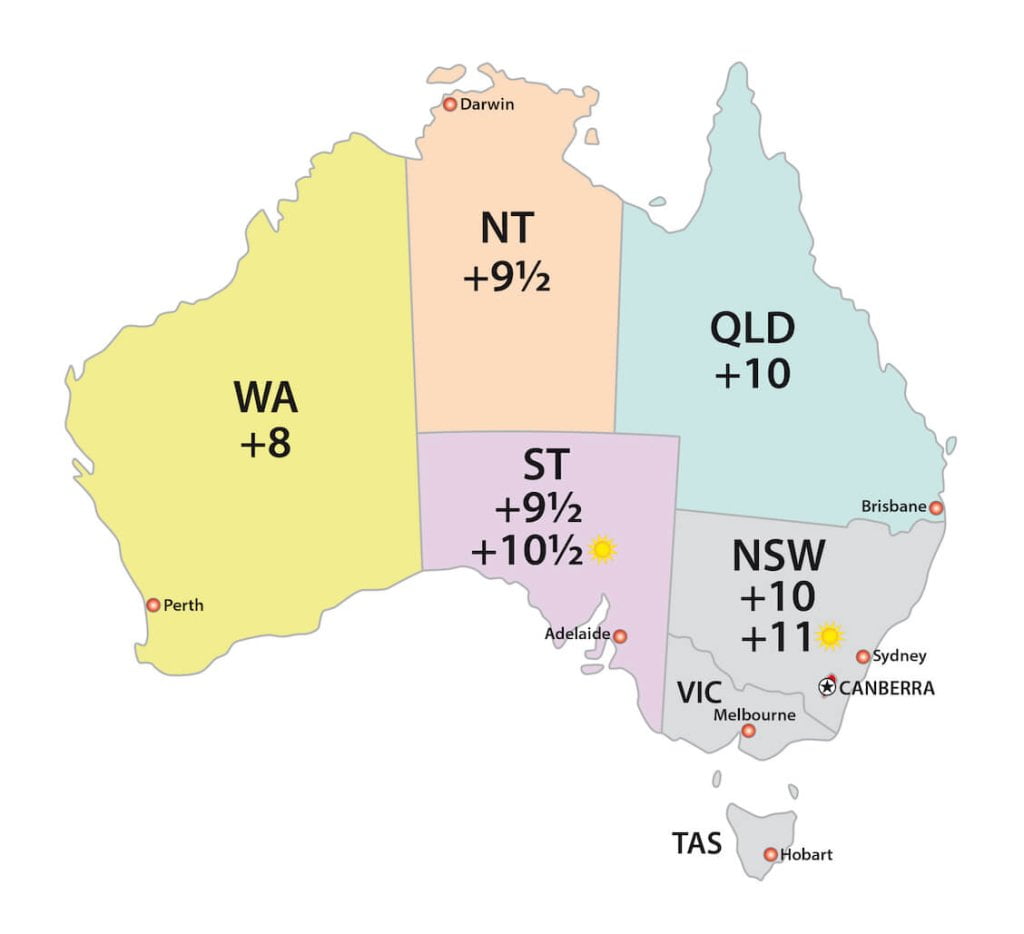
As a remote employee based in Western Australia, working for a company located in Sydney, I’ve often struggled with managing the different time zones. It can be challenging to keep track of what time it is in Sydney, especially when daylight saving time is in effect. I found myself constantly checking the clock and worrying about whether I was working the correct hours.
What Are the Time Zones in Australia?

There are three main time zones in Australia:
- Australian Eastern Standard Time (AEST): Covers the eastern states of Queensland, New South Wales, Victoria, Tasmania, and the Australian Capital Territory. This time zone is 10 hours ahead of Coordinated Universal Time (UTC+10).
- Australian Central Standard Time (ACST): Covers South Australia, the Northern Territory, and the town of Broken Hill in western New South Wales. This time zone is 9.5 hours ahead of Coordinated Universal Time (UTC+9.5).
- Australian Western Standard Time (AWST): Covers Western Australia. This time zone is 8 hours ahead of Coordinated Universal Time (UTC+8).
Plus, there are three additional time zones in smaller Australian territories:
- Norfolk Island Standard Time (NFT) Norfolk Island Kingston (UTC +11)
- Christmas Island Standard Time (CXT) Christmas Island (UTC +7)
- Cocos (Keeling) Islands Standard Time (CCT) (UTC + 6.30)
Why It Is Hard to Work in Different Time Zones
Working in different time zones can be really challenging, especially as a remote worker. As someone who has experienced this firsthand, I know just how complicated it can be to manage different time zones.
Take my situation for example. I am based in the beautiful town of Bunbory – but the company I work for remotely is based in Sydney.
As a remote worker based in Bunbury, I have had to work with colleagues based in Melbourne and Sydney, which are in different time zones. Sometimes it’s difficult to keep track of what time it is in the eastern states, and I have missed a few meetings because I miscalculated the time difference. I’ve also had to adjust my working hours to accommodate meetings that are scheduled at inconvenient times, which can disrupt my work-life balance.
Another challenge is staying productive when your colleagues are working in a different time zone. I’ve found myself struggling to stay motivated when I’m working outside of normal business hours, and it can be difficult to get the support I need when my colleagues are not available. This can be frustrating, especially when you’re working on a project that requires close collaboration with others.
The time difference between Bunbury and Sydney is only 2 hours. But even such a seemingly insignificant time difference can have a major impact on your working routine.
I found myself struggling to keep track of the different time zones. Daylight saving time further complicated matters, as the time difference changed throughout the year. It was tough to coordinate meetings and collaborate effectively when our working hours didn’t overlap. Despite these challenges, I knew I needed to find a way to manage my time better and work more efficiently.
How to Manage Time Zones Better as a Remote Worker?
As a remote worker based in Bunbury, but working for a company located in Sydney, I have struggled with managing different time zones. It’s challenging to balance work schedules and communication when there is a two-hour time difference. However, over time, I have discovered some tips that have helped me manage my time better and increase my productivity.
- First, I recommend using a time zone converter to help you quickly and accurately determine the time difference between your location and your employer’s location. This will help you schedule meetings and tasks more effectively.
- Second, communicate your schedule: make sure your team and clients are aware of your work schedule, including your working hours and the time zone you are in. This can help avoid confusion and ensure that everyone is on the same page.
- Third, I found that setting clear boundaries with my employer and colleagues has helped me balance work and personal life. By discussing the time difference and establishing preferred communication methods, such as email or messaging, we can avoid unnecessary interruptions and maintain a healthy work-life balance.
- Fourth, I found setting reminders to be very helpful. I use reminders and alarms to stay on top of important meetings and deadlines, especially if they are in a different time zone. I set reminders on my phone and computer to make sure I don’t miss anything important.
- Fifth, it’s very important to take breaks: Working across different time zones can be mentally exhausting, so it’s important to take regular breaks and rest when needed. This helps me stay focused and productive in the long run.
- Finally, I make use of every tool available to me that can help improve my time management. I have found time trackers to be particularly helpful.
How to Choose a Time Tracker for Working in Different Time Zones
When choosing a time tracker, I think it’s important to consider the following:
Time Zone Settings
First and foremost, look for a time tracker that allows you to set your time zone based on your current location or the location of your employer. This can make things substantially easier on both sides – and help you make sure you don’t miss important meetings, deadlines and track your working hours correctly.

I found a time tracker called Traqq particularly useful when it comes to time zones. It lets me easily set the time zone I am working in – and automatically detetcts the time zone I am in. Speaking of that.
Automatic Time Zone Detection
Some time trackers can automatically detect your time zone based on your IP address or GPS location. This is very helpful – especially when travel. When a time tracker autmatically detects your time zone, it saves you quite a bit of time and helps avoid unpleasant surprises such as missed deadlines and meetings with colleagues.
Time Tracking Features
Consider the features that are important to you, such as the ability to track time spent on specific tasks, create detailed reports, or integrate with other tools.
User-friendliness
Choose a time tracker that is easy to use and has an intuitive interface. Trust me, when you are working on an important project or running late on a deadline, the last thing you want to do is spend time figuring out how a time tracking app works.
Compatibility
Make sure the time tracker is compatible with your devices and operating systems – and other productivity tools you may be using.
Overall, a good time tracker should help you keep track of your work hours and tasks, and make it easier to manage different time zones as a remote worker.
Managing different time zones as a remote worker can be challenging, but by using these tips and tools, it can be made much easier. It’s important to establish clear communication, set boundaries, and use time management tools to ensure that you are productive and efficient, while also maintaining a healthy work-life balance.
Working in the US? Here is a full guide on managing US time zones.
